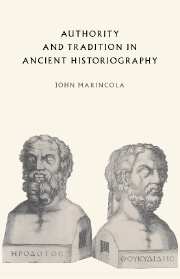Book contents
- Frontmatter
- Contents
- Preface
- List of abbreviations
- INTRODUCTION
- I THE CALL TO HISTORY
- II THE HISTORIAN'S INQUIRY
- III THE HISTORIAN'S CHARACTER
- IV THE HISTORIAN'S DEEDS
- V THE ‘LONELY’ HISTORIAN: CONTRAST AND CONTINUITY
- CONCLUSION
- Appendices
- I Table of historians
- II Name and nationality
- III Isocrates on autopsy and inquiry?
- IV Variant versions
- V The Roman convention of ‘nos’ and ‘nostri’
- VI Greek continuators
- VII Roman continuators
- Bibliography
- Index locorum
- Index of Greek words
- General index
V - The Roman convention of ‘nos’ and ‘nostri’
Published online by Cambridge University Press: 29 January 2010
- Frontmatter
- Contents
- Preface
- List of abbreviations
- INTRODUCTION
- I THE CALL TO HISTORY
- II THE HISTORIAN'S INQUIRY
- III THE HISTORIAN'S CHARACTER
- IV THE HISTORIAN'S DEEDS
- V THE ‘LONELY’ HISTORIAN: CONTRAST AND CONTINUITY
- CONCLUSION
- Appendices
- I Table of historians
- II Name and nationality
- III Isocrates on autopsy and inquiry?
- IV Variant versions
- V The Roman convention of ‘nos’ and ‘nostri’
- VI Greek continuators
- VII Roman continuators
- Bibliography
- Index locorum
- Index of Greek words
- General index
Summary
It is characteristic of the Roman historians to use the first-person plural frequently when referring to the Roman state or to Roman soldiers in battle. Cato may have been the first to do this, since one fragment of the Origins speaks of ‘our commander’. By Sallust's time, the convention is already fully developed. He speaks of ‘our ancestors’, ‘our state’, ‘our army’, and he refers to Romans in battle as ‘our men’, ‘our forces’ or simply ‘nostri’. Caesar as well in the Gallic War refers to ‘our men’.
Sallust does not use this convention, however, in the Catiline, nor do the Romans use this designation when writing about civil war, where it might seem manifestly inappropriate. A striking exception is Caesar, who even in the Civil War uses ‘nostri’ — but as a reference to his own men, not the Roman soldiers of his enemies. This must have been a bold step, and, if not pure arrogance, may perhaps be taken as another indication that the work lacked his ultima manus. Of Caesar's continuators the authors of the Alexandrian War and the Spanish War use ‘nostri’ of Caesar's men, the author of the African War does not.
Velleius too speaks of Roman soldiers in the first person plural, the more appropriately in that he himself was a soldier and participant; but he also follows the convention where he is not involved, referring to ‘our empire’ and ‘our slaughter’ by Ariminius.
- Type
- Chapter
- Information
- Authority and Tradition in Ancient Historiography , pp. 287 - 288Publisher: Cambridge University PressPrint publication year: 1997

